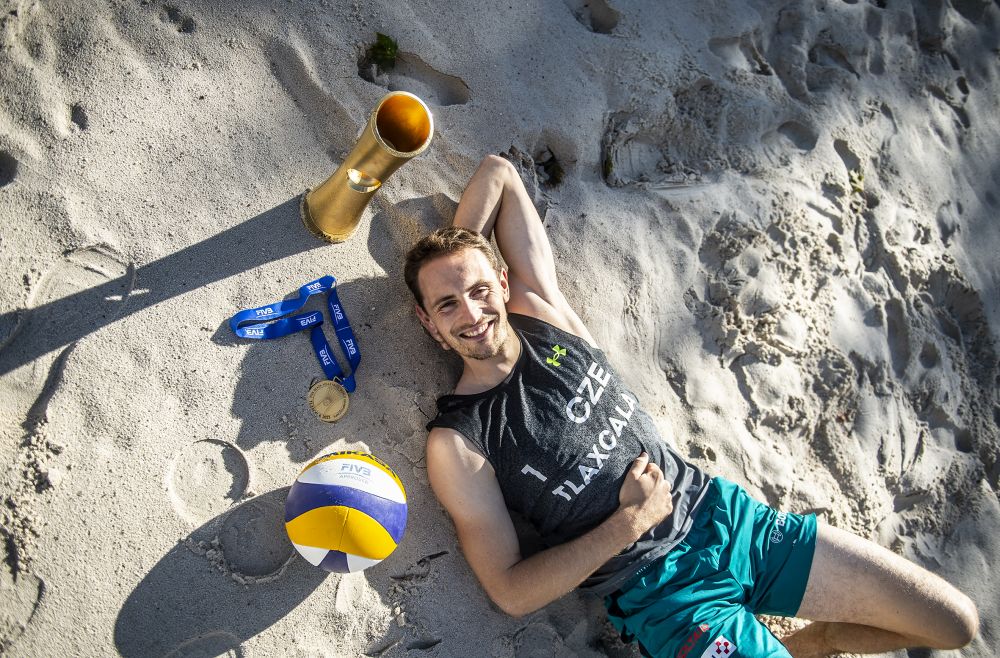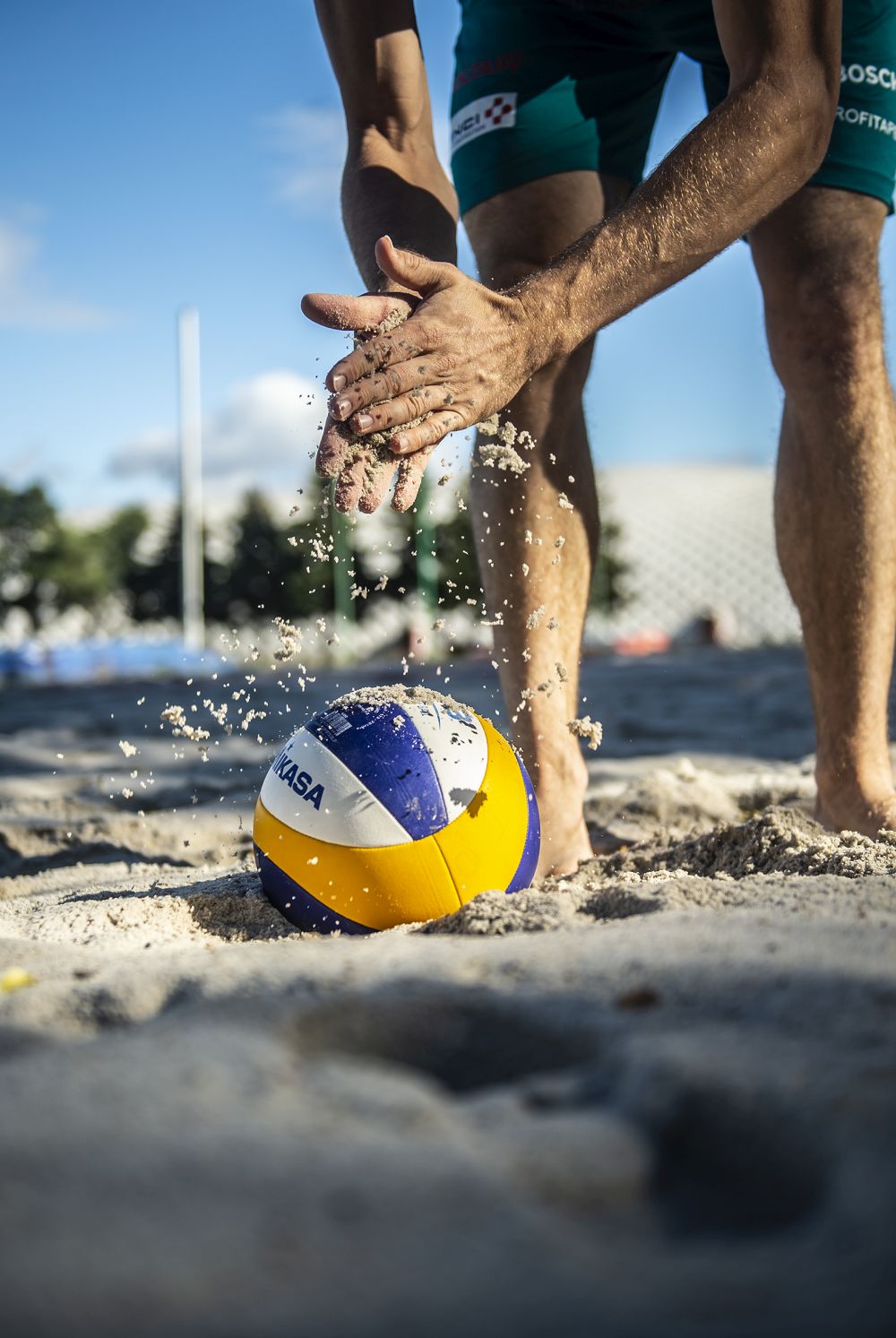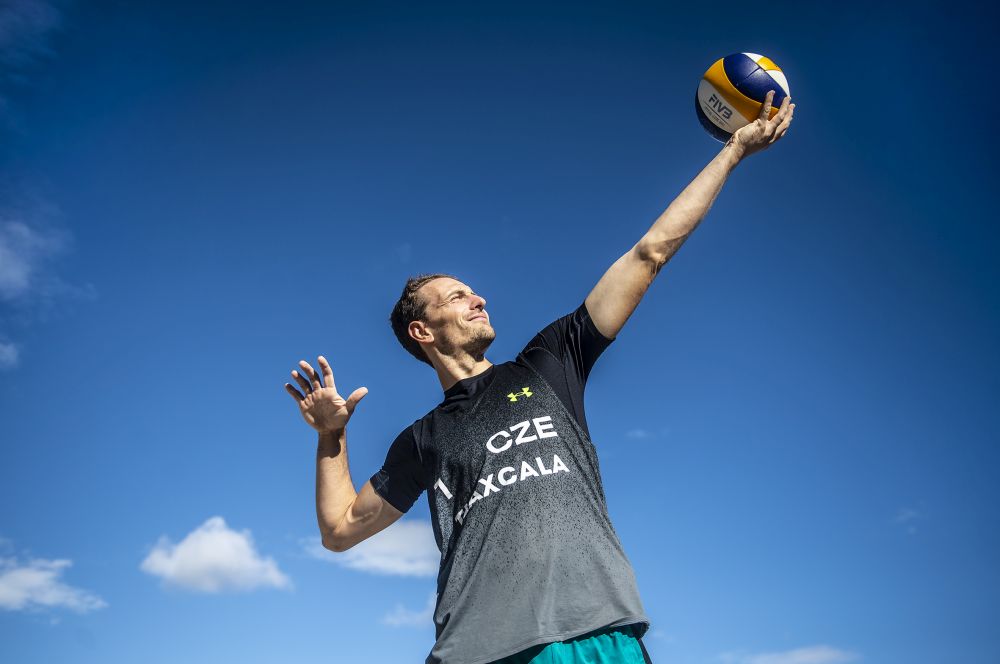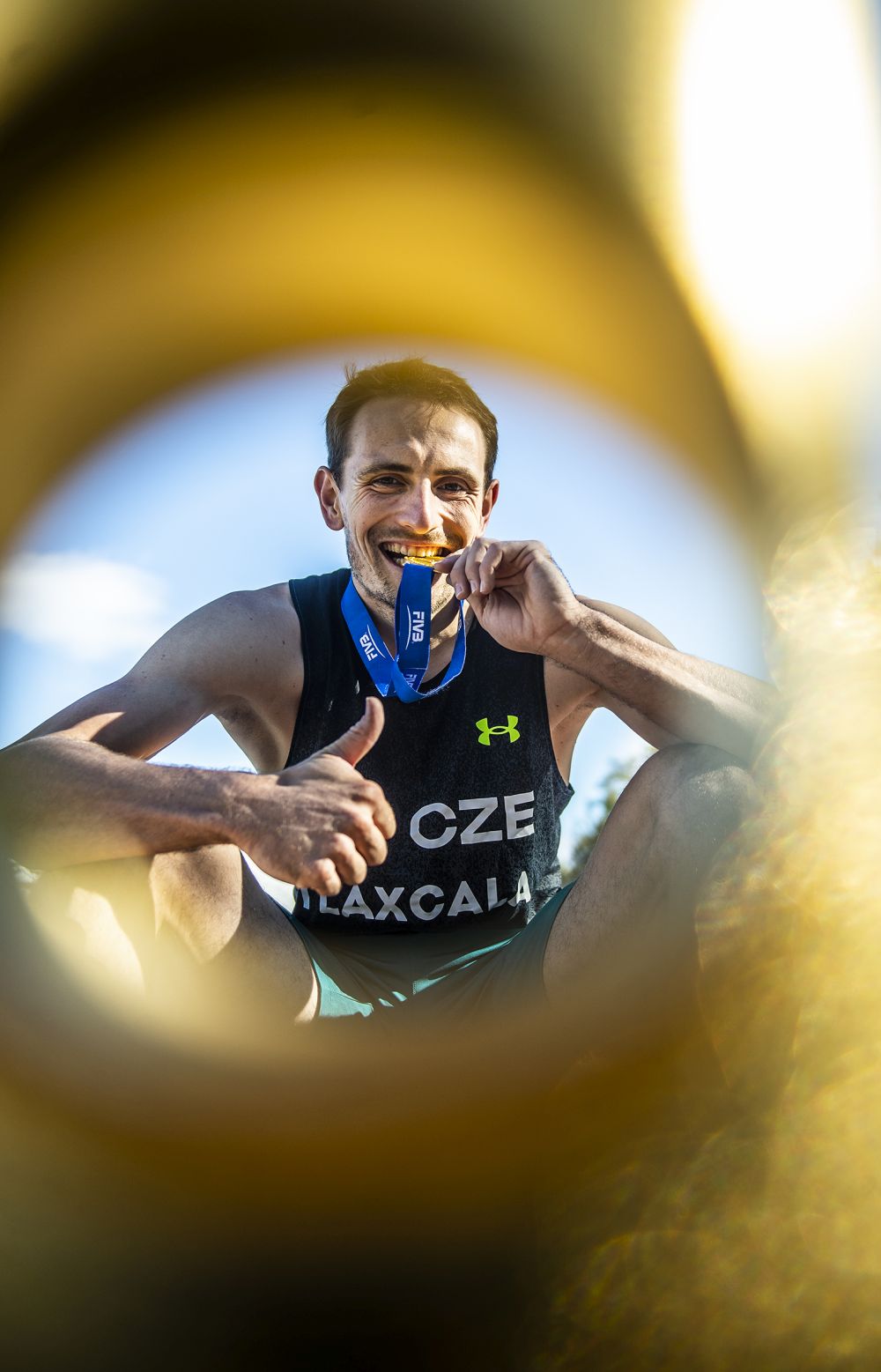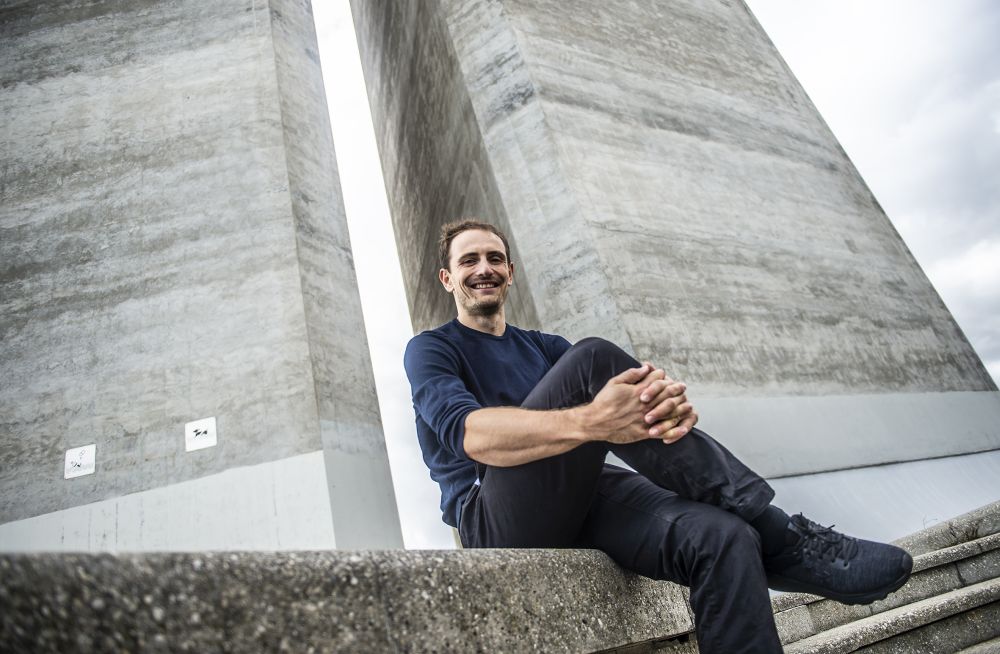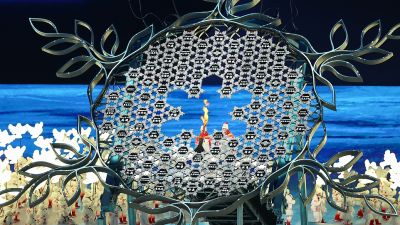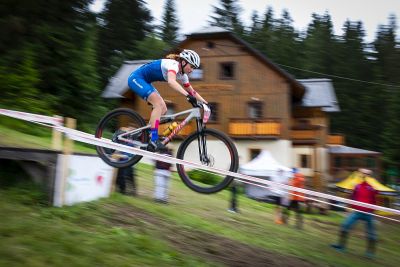Many people know CU student Ondřej Perušič by his nickname, Perun, after the Slavic god of thunder and lightning. Last October, fans saw the heights a god of thunder can reach: he and David Schweiner won gold at the World Beach Volleyball Championships in Mexico. In addition to top sport, Perušič, who has studied at the Faculty of Law of Charles University applied successfully to the Faculty of Arts of Charles University. The reason? He didn’t want to be idle in the run-up to the Olympic Games in Paris, France, in the summer of 2024.
With your win you attracted a lot of media attention; what did you learn about yourselves after winning the World Championships?
We are trying to follow what’s being reported, but we are not so fixated on ourselves that we would have to follow everything that was written about us. I've been working with David for eight years, and with our Italian coaches, led by Andrea Tomatis, for seven, and we've got to know each other very well in that time. The circus following our win rather confirmed what I have known about our team for a long time, which is that neither success nor increased media interest will change us in any way. Of course, there are athletes who don’t handle fame well. But I don’t think we are among them – at least not yet (laughs). We are making sure that it won’t go to our heads in the future, either.
When you give interviews, you often talk about the role of athletes in society. Will you use the attention you have received now to promote certain topics?
There is a direct proportionality between how successful you are, how popular and well-known you are, and the degree of responsibility you then take for your public appearances, and the influence you have not only on young athletes, but on shaping public discourse or society in general. Our success in Mexico had quite an impact, at least within the sporting world. We therefore want to act responsibly as role models for children and young athletes, not only by trying to approach offers to work with them as much as possible, but also by being careful about how we speak publicly. The past years have shown that athletes are not always able to talk meaningfully about issues that have implications well beyond the world of sport, and we would not like to follow these negative examples.
You graduated from the Faculty of Law of Charles University but you opted to continue your studies at the Faculty of Arts. Besides sports and law you are also interested in contemporary history. Where do you get the drive for all your activities?
I've always admired people who were rather versatile and had a broader outlook or expertise than just one subject. I have never been tempted to be just a professional athlete who is not interested in anything other than sport. I grew up in a family where education always came first, but at the same time I was encouraged to have other hobbies. In the beginning, I enjoyed sports a lot and it was fulfilling; but about five years ago I changed. When you are inside the sporting world for a long time you enjoy all the benefits that come with it, but at the same time you start to realise how closed a world it is and how superficial and stereotypical it is in a sense. When I graduated from law school, I knew I was two years away from the Olympics in Paris. I wanted to use the time in a meaningful way, and because I enjoy self-education and learning new things, at that time I was not concerned with whether to continue studying, but rather which field of study.
Because of your first-place finish, you qualified for the Olympics in Paris. How will you now combine your studies with preparation for the summer games?
It’s complicated things a little. I was counting on doing my best to complete all my courses now and leave the thesis writing until after the Games. Now I'd like to try to write my rigorous thesis over the winter. I've added political theory as a minor in history, so I'm counting on finishing in the 2024/2025 academic year.
What would you like to write your thesis about?
I would like to focus on an Italian corruption case and subsequent prosecution in the 1980s and 1990s known as the Clean Hands Action (a term that later also appeared in Czech politics). The result was the collapse and then disintegration of Christian democracy, which had ruled Italy almost continuously since the end of the Second World War. This is interesting not only in terms of the corruption case itself, but also the collapse of the system as a whole. A power vacuum was then created in the country, which was quickly filled by Silvio Berlusconi and his Forza Italia. It is a timeless subject and very topical today, given the populist waves that seems to threaten the foundations of democracy.
Italy, in general, is very close to my heart, not only in terms of gastronomy (laughs), but also in terms of history and culture. Moreover, I am learning Italian. Especially at the beginning of the cooperation with our coaches, we spent maybe four months a year there. It's my second home.
Your thesis at the Faculty of Law, meanwhile, touched on the topic of the ‘athlete as entrepreneur’...
I dealt with the status of the athlete as an entrepreneur from the point of view of commercial law. The commercial side of professional sport is gaining in dimension nowadays. Most of us encounter it in the form of astronomical salaries of football or basketball stars. The whole sporting system is changing rapidly, but the law is slow and difficult to respond to these changes. I addressed, for example, the fact that the regulation of professional sport is not ideal, on various levels. For example, the division between individual and collective sports is problematic. It is not an appropriate set of terms to work with such a diverse sector, because professional sport today consists of many different disciplines. Each sector has its own specificities with which the law has to cope in some way. I am pleased that more and more attention is being paid to the regulation of sport today, because sport generates a huge amount of money and is of considerable social importance.
Will your rigorous thesis further develop this theme?
No, it is supposed to be closer to my current studies and it stands at the borderline between constitutional law and political science. I would like to try to write an analysis of the Czech constitutional system and focus on how it is prepared for the challenges that the 21st century has brought to our democracy and system.
When you talk about your sporting achievements, you never forget to mention the name of the statistician Jaroslav Bartoš in addition to your coaches. How important is it for top sport to work with data and statistics?
Working with data, analysing your own performance or, on the contrary, the opponent's game, are now an integral part of professional sport. When you have a good coach-stats tandem and good software, the competitive advantage over other teams can be significant, because in smaller sports like beach volleyball not all teams work with data. And if they do, not all of them can interpret or analyse it well. The fact that our coach and statistician can put together a set of data and then use it to develop a good strategic or tactical plan for the game is one of our biggest strengths. However, we also need to mention the other side of the coin. Unlike six-a-side volleyball, we don't have a coach on the bench, so we can't communicate with him during the match. This means that we have to be able to absorb a lot of information before the game and then implement it on the court into the game. Neither David nor I excel in physical parameters or unusual technical prowess, our strength is in tactical preparation and the ability to follow our game plan.
After your return home from Mexico, David pointed out at the press conference how much you supported him mentally during the dramatic final match. What do you manage to say to each other on the sand court during the game?
We try to keep a good atmosphere on the sand court during the game. In the moments when things don't go our way, we still try to be rational, not to give in to the pressure or the feeling that everything is not going the way we planned. In beach volleyball, you usually focus on one player and put him under more pressure. The team has to be prepared for that because the other player who is not under pressure has to take a leadership role, analyse the play, look for what works, and focus on making sure the team follows the tactical guidelines. The player who is under pressure doesn't have the capacity to do that, his field of vision narrows. That's how mutual support should work.
The Swedish duo managed to throw David off his rhythm in the final, reducing your point lead, and you changed your position on court. Did you have to make that decision in a flash?
The end of the tiebreak was a demonstration of applying one of the basic rules our coach guides us to: when we are not doing well, we have to be able to quickly identify the problem and change something in our game. And that's exactly what happened in the third set of the final match. David couldn't attack from his standard position, so we switched places on the court, which changed the situation for us, but mainly for our opponent. They weren't used to it or prepared for it.
You never seem to rest. You've barely arrived from the World Championships, you've given dozens of interviews, met with fans and others, and you've already left again for training in Italy. Does your season never end?
A few years ago, beach volleyball switched to a system similar to tennis. The tournaments are spread throughout the calendar year and this season has been extreme. We need to stay among the top five teams in the world to enter the Olympic tournament as the number one seed in our group and avoid the strongest teams on paper. We need to get 12 very good results over the course of a year and a half, which forces everyone to play as hard as they can. Not that we need amazing results now, but since I was injured in the summer and we had to miss some tournaments, we needed to play well at least one more tournament after the championship so that next season we won't be stressed and can rest. Then all we have to do is prepare well for the Paris Olympics!
| Ondřej Perušič |
| Ondřej Perušič is graduate of the Faculty of Law of Charles University, he is currently pursuing his Master's degree at the Faculty of Arts of Charles University (in history and political theory). Until he was nineteen, he also played floorball at the top level, and since October 2023 he and David Schweiner have been the first ever Czech world champions in beach volleyball. They were slated to compete at the 2021 Olympic Games in Tokyo, but Ondřej contracted Covid-19 immediately after his arrival. Ondřej's wife Mariana is a graduate of the First Medical Faculty of Charles University and is currently pursuing her PhD studies at the Second Medical Faculty of Charles University. Ondřej's grandfather, Boris Perušič, represented in classic volleyball and won silver at the 1964 Olympics. Clearly, a talent for volleyball runs in the family. |


